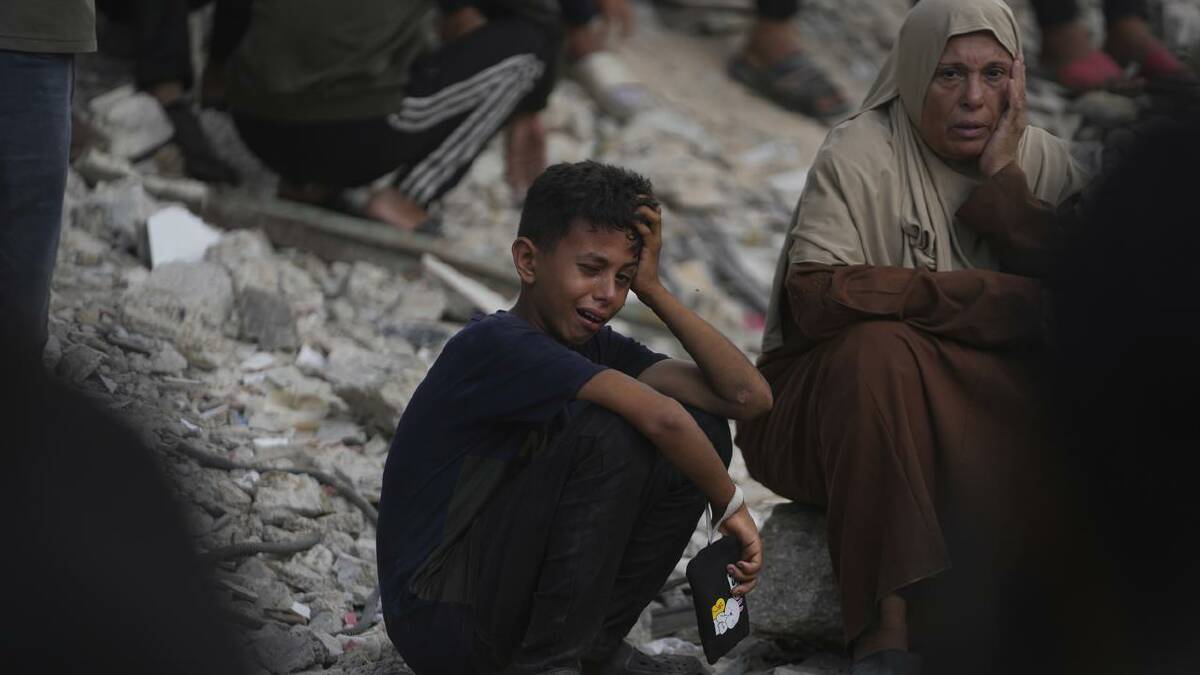
Israel says it will halt military operations each day for 10 hours in parts of Gaza and allow new aid corridors in the shattered enclave, where images of hungry Palestinians have alarmed the world.
Subscribe now for unlimited access.
or signup to continue reading
See subscription optionsMilitary activity will stop from 10am to 8pm local time (0700-1700 GMT) until further notice in Al-Mawasi - a designated humanitarian area that stretches along the coast - in central Deir al-Balah and Gaza City to the north.
The military said designated secure routes for convoys delivering food and medicine will also be in place between 6am and 11pm from Sunday.
United Nations aid chief Tom Fletcher said staff would step up efforts to feed the hungry during the pauses in the designated areas.
"Our teams on the ground ... will do all we can to reach as many starving people as we can in this window," he said in a post on X.
Health officials at Al-Awda and Al-Aqsa Hospitals in the central Gaza Strip said Israeli firing killed at least 17 people and wounded 50 people waiting for aid trucks on Sunday.
A spokesperson for Israel's military did not immediately respond to a request for comment.
Thousands of Gazans gathered in locations where they expect aid trucks to roll through on Sunday, Reuters witnesses and locals said.
Dozens of Gazans have died of malnutrition in recent weeks, according to the Gaza Health Ministry in the Hamas-run enclave.
The Gaza health ministry reported six new deaths in the past 24 hours due to malnutrition, bringing the total number of deaths from malnutrition and hunger to 133, including 87 children.
The Egyptian Red Crescent said it was sending more than 100 trucks carrying 1200 metric tons of food aid to southern Gaza on Sunday through the Kerem Shalom crossing.
Hours earlier, Israel began aid airdrops in what it said was an effort to ease the humanitarian conditions in the enclave.
Aid groups said last week there was mass hunger among Gaza's 2.2 million people and international alarm over the humanitarian situation in Gaza has increased, driving French President Emmanuel Macron's decision to recognise a Palestinian state in September.
The UN said last week humanitarian pauses in military activity would allow "the scale up of humanitarian assistance", adding that Israel had not been providing enough route alternatives for its convoys, hindering aid access.
Israel, which cut off the aid flow to Gaza from the start of March and reopened it with new restrictions in May, says it is committed to allowing in aid but must control it to prevent it from being diverted by militants.

It says it has let enough food into Gaza during the war and blames Hamas for the suffering of Gaza's people.
Israel and the US appeared on Friday to abandon ceasefire negotiations with Hamas, saying it had become clear the militants did not want a deal.
Many Gazans expressed tentative relief about Sunday's announcement, but said the fighting must end permanently.
Others voiced concern about how aid would be delivered and whether it would reach people safely.
Israel's far-right National Security Minister Itamar Ben-Gvir criticised the aid decision, which he said was made without his involvement on Saturday by Israeli Prime Minister Benjamin Netanyahu and defence officials.

"This is a capitulation to Hamas' deceitful campaign," he said in a statement, repeating his call to choke off all aid to Gaza, conquer the territory and encourage its Palestinian population to leave.
He stopped short of threatening to quit the government.
A spokesperson for Netanyahu did not immediately respond to a question about Ben-Gvir's comments.
After letting in aid in May, Israel said there was enough food in Gaza but that the UN was failing to distribute it. The UN said it was operating as effectively as possible under Israeli restrictions.
The war began on October 7, 2023, when Hamas-led fighters stormed southern Israel, killing some 1200 people, mostly civilians, and taking 251 hostages back to Gaza.
Since then, Israel's offensive against Hamas has killed almost 60,000 people in Gaza, mostly civilians, according to Gaza health officials, reduced much of the enclave to ruins and displaced almost the entire population.
Australian Associated Press

